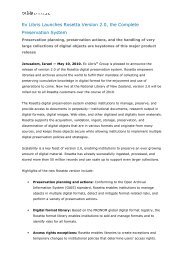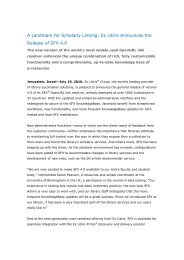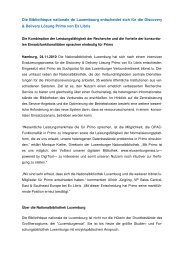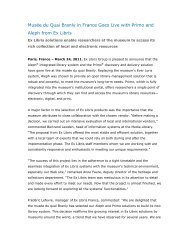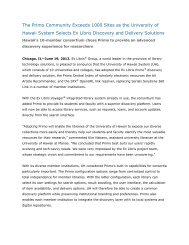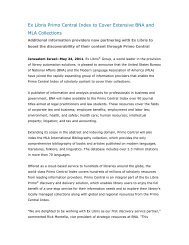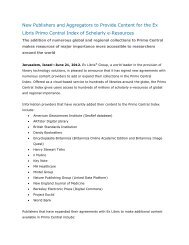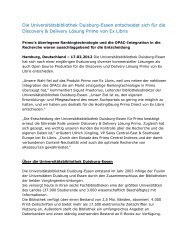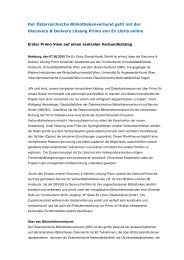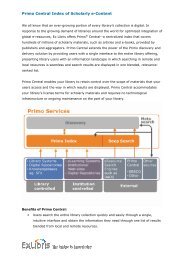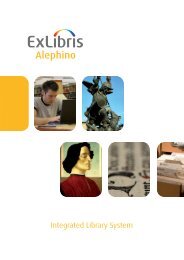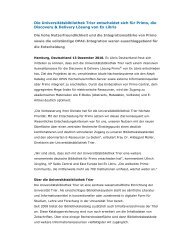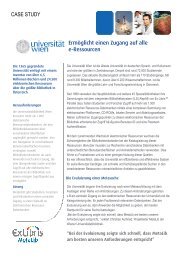October 2005 Issue - Ex Libris
October 2005 Issue - Ex Libris
October 2005 Issue - Ex Libris
You also want an ePaper? Increase the reach of your titles
YUMPU automatically turns print PDFs into web optimized ePapers that Google loves.
<strong>Ex</strong> <strong>Libris</strong> and Google—<br />
What’s New?<br />
<strong>Ex</strong> <strong>Libris</strong> has been an enthusiastic participant and contributor<br />
to the Google Scholar initiative whereby OpenURL links are<br />
placed in Google Scholar search results. Many libraries are<br />
taking advantage of the new tools and products we've<br />
created to ensure that local library services, are readily<br />
available to Google Scholar searchers.<br />
Google Scholar was launched in November 2004 to the<br />
great interest of both researchers and librarians. Its content,<br />
versus that of the main Google search engine, which indexes<br />
the Web at large, is focused on "peer-reviewed papers, theses,<br />
books, preprints, abstracts and technical reports from broad<br />
areas of research."<br />
The service indexes a wide range of scholarly materials, and<br />
for many researchers is a fine blend of expert information<br />
and ease of use. However, the direct links to publisher full<br />
text shown in Google Scholar search results may not be<br />
freely available to library patrons, either because the library<br />
does not subscribe to the article via the publisher, or because<br />
the user is working off-campus and his/her IP is not<br />
recognized by the publisher's Web site. These problems<br />
have long been referred to in libraries as the "appropriate<br />
copy problem"—for which the OpenURL and link servers<br />
are the perfect antidote.<br />
<strong>Ex</strong> <strong>Libris</strong> has collaborated with Google Scholar, in the context<br />
of SFX®, since its launch. Through the Google Scholar<br />
"institutional access program," libraries may register their<br />
SFX server with Google Scholar, and allow their library patrons<br />
to access material licensed by the library, as well as show<br />
them other extended services via the SFX menu.<br />
Google Scholar first offered the institutional access program,<br />
which OpenURL-enabled search results, in February <strong>2005</strong><br />
to a pilot set of libraries, nearly all of whom were SFX<br />
customers. With the comments and data received by the<br />
pilot libraries, Google Scholar was able to set the groundwork<br />
for broader availability of the program. May <strong>2005</strong> saw the<br />
program open to all libraries, and with this wider availability,<br />
the SFX staff published registration tools for Google Scholar<br />
in the Admin interface for SFX version 3. Any SFX customer<br />
may now register itself for SFX links to be shown to its users<br />
via the Google Scholar search results screen.<br />
Through a simple Web tool, SFX librarians create an export<br />
file reflecting library full-text holdings which have been<br />
activated in the SFX local KnowledgeBase. This information<br />
is then made available for Google Scholar which will, on an<br />
end user's list of search results, display a prominent link to<br />
the library's full-text availability. If full-text is not available, a<br />
less prominent SFX link will show. The user can then follow<br />
the link to other extended services offered by the library.<br />
- 4 -<br />
In May <strong>2005</strong>, <strong>Ex</strong> <strong>Libris</strong> launched the "ScholarSFX" service,<br />
which is a free service targeted at libraries which do not<br />
have a link resolver, but would like to localize Google Scholar<br />
search results as much as possible for their users. ScholarSFX<br />
is based on the SFX eXpress interface and allows a library to<br />
configure full-text subscriptions and register for the Google<br />
Scholar institutional access program, all via a Wizard interface.<br />
Thousands of freely-available journals are configured in the<br />
ScholarSFX service. Several dozen libraries have already<br />
registered for this service and are receiving SFX services via<br />
Google Scholar. We hope that ScholarSFX will prove useful<br />
to any library who hasn't had the opportunity to benefit<br />
from a link resolver. For more information please see<br />
http://www. exlibrisgroup. com/scholar_sfx.htm<br />
Attendees of the June North American SMUG meeting in<br />
College Park, Maryland greeted Anurag Acharya, Principal<br />
Engineer at Google and the creator of Google Scholar, who<br />
presented the product and his views on the institutional<br />
access program. Acharya was a lively, opinionated presenter<br />
who arrived with much data on click through usage, preferred<br />
links, and user experience, using this information to explain<br />
the reasons behind the design of the Google Scholar and<br />
the institutional access program. The audience took part in<br />
a spirited discussion with him about Google Scholar content,<br />
indexing, and holdings requirements. By the end of Acharya's<br />
visit he had managed to win over much of the audience<br />
with his focus on a shared desire to make systems easier for<br />
researchers to find useful, quality material. He also admitted<br />
that he is in favor of directing users back to local libraries via<br />
the search engine trend.<br />
The Google Scholar requirement that libraries must expose files<br />
reflecting their electronic holdings in order to register for<br />
institutional access links has been a controversial one among<br />
SFX customers. OpenURLs give librarians control over which<br />
services are shown to an end user, and many librarians feel<br />
strongly that the very reason they maintain an SFX server is to<br />
be sure that a user is given a way to access an article, even if fulltext<br />
is not available locally. In direct contrast to other information<br />
providers, Google Scholar requires that libraries provide data to<br />
it in advance of showing any OpenURL link .<br />
<strong>Ex</strong> <strong>Libris</strong> believes that Google's understanding of the critical<br />
need for the scholarly community to direct users to their home<br />
library for the provision of services marks a significant milestone<br />
for libraries. The Company is thus pleased to be able to provide<br />
tools that enable librarians to decide for themselves whether<br />
they wish to offer such services to their users. The inclusion of<br />
OpenURL in a search engine resource such as Google Scholar<br />
is an important advancement in the relationship between<br />
libraries and information providers, and we look forward to<br />
continuing the collaboration. We hope our customers will<br />
continue to send us any questions or comments.<br />
Contributed by Nettie Lagace, SFX Product Manager,<br />
<strong>Ex</strong> <strong>Libris</strong>, nettie.lagace@exlibris-usa.com.



